Investing.com’s stocks of the week
by Pinchas Cohen
Key Events
Yesterday the US market recovered about half of Tuesday’s 0.75 percent slide and long-term government bonds declined after President Donald Trump and ironically, Democratic lawmakers reached an agreement to extend the US debt limit until the end of the year and fund the government through mid-December, as well as provide aid to victims of Hurricane Harvey.
Reacting to the news, today, Asian markets were mixed. At first, they started strong with investors trading risk-on in the aftermath of the US debt-ceiling deal. But then regional markets retreated on concerns of another North Korean ballistic missile launch as the calendar approaches the country's September 9 “founding day” holiday. Ultimately, most Asian equities finished higher.
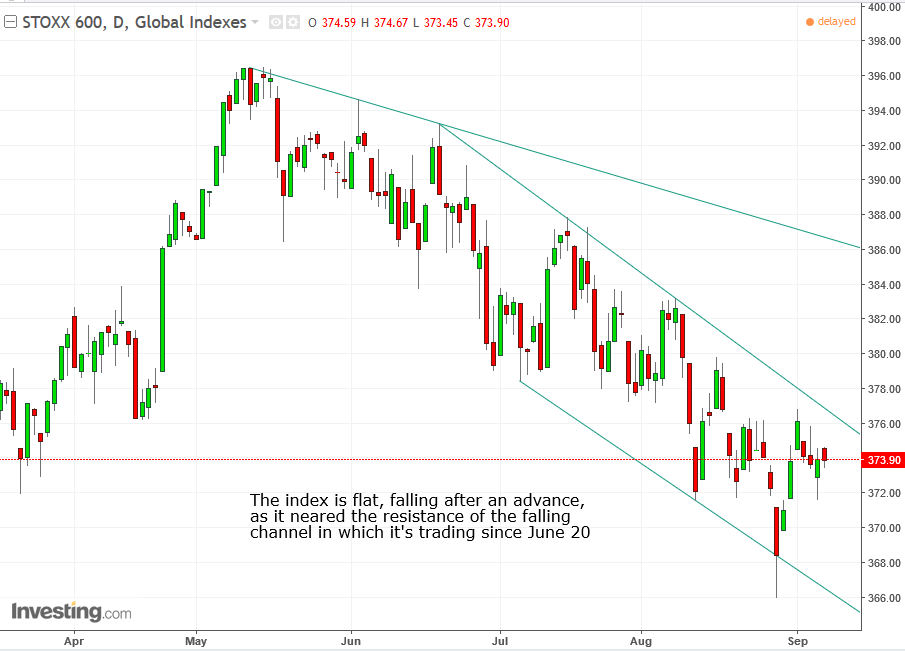
Since this morning's open, the Stoxx Europe 600 has been trying to gain traction. However, it's been held down by miners after a rally in industrial metals paused.
S&P 500 Futures declined this morning, after a volatile US market close yesterday, in response to fast-moving events. While the debt ceiling deal provided investors with a measure of certainty, it was quickly offset by the resignation of Federal Reserve Vice Chairman Stanley Fischer, as well as an unexpected Canadian interest rate hike.
Fischer, 73, who has been called "a global central bank giant" by some, previously served as chief economist for the World Bank and as the governor of the Bank of Israel, the Middle Eastern country's central bank, during the financial crash of 2008. Under his watch, which ran from 2005-2013, Israel was one of the very few countries not sucked into the financial crash, after the Bank of Israel instituted strict banking and mortgage regulations.
In 2010, the Bank of Israel was ranked first among central banks for its efficiency, according to the IMD’s World Competitiveness Yearbook. Fischer was widely praised for his handling of the Israeli economy in the aftermath of the global financial crisis and it was the first bank in the developed world to raise rates, as early as September 2009. As well, earlier in his career, Fischer taught at both the University of Chicago and the Massachusetts Institute of Technology. Among his students: current ECB President Mario Draghi and former Fed Chair Ben Bernanke.
Fischer's resignation, effective on or around October 13, ahead of the expiration of Fed Chair Janet Yellen's term which ends January 2018, increases the uncertainty surrounding an already uncertain market. Moreover, analysts say Fischer’s resignation decreases the likelihood that Yellen will want to stay on after her term is over.
This would leave President Trump with at least four Fed vacancies. That may scare some investors, if they don’t feel comfortable with Trump’s style as president, while others may be optimistic at the prospect of looser regulations.
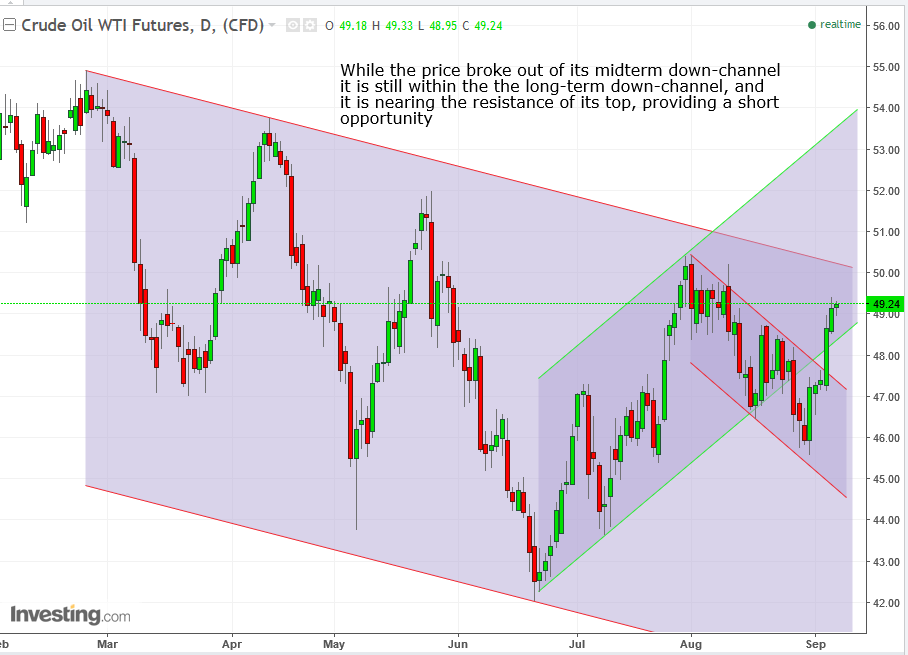
And there’s yet more uncertainty. Investors are still closely following Category 5 Hurricane Irma, now in the Caribbean and on its way to Florida. The prospect of it touching down along the US east coast this weekend is depressing the price of WTI crude oil after it rose yesterday, above $49 for the first time in a month.
In still another sign of the divergent risk sentiment between equity traders and dollar and bond traders, while US stocks closed higher yesterday, dollar and Treasury traders—as ever—are more sensitive to the lingering threat of North Korea and the uncertain path of interest rates and shrinking of the balance sheet.
The dollar was sold off and Treasuries were bought, pushing yields lower. Proof for the debt ceiling agreement’s waning affect on investor certainty: the dollar’s gains versus the yen after the event are currently being erased.
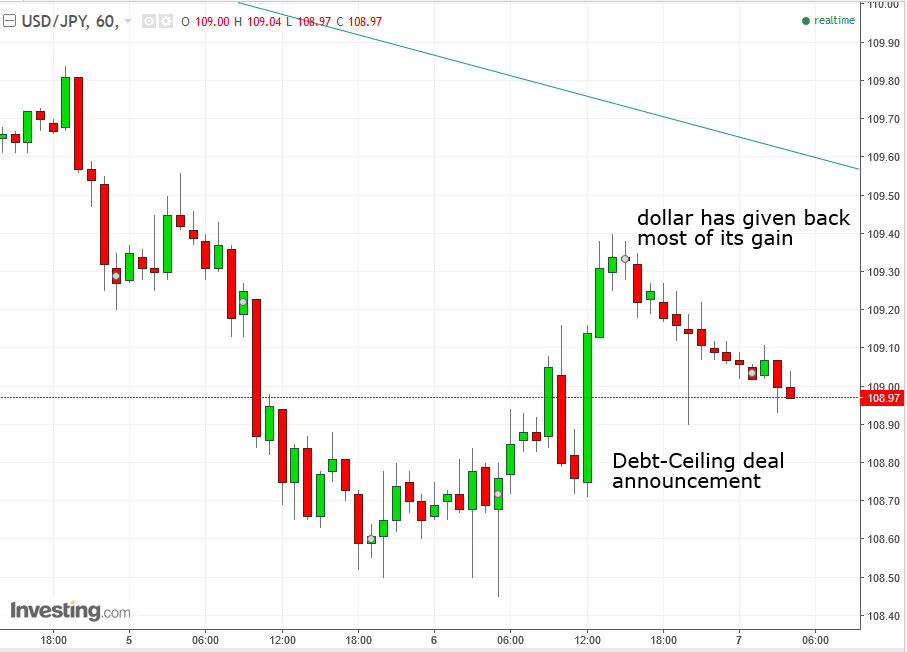
Later this morning attention is certain to focus on the ECB meeting, in which investors will surely seek clarity from President Mario Draghi on the ECB’s path to balance sheet normalization. The euro could see some reaction-driven trading immediately after the event based on Draghi's tone if not his remarks.
Up Ahead
- ECB President Mario Draghi holds a much-anticipated press conference after the central bank’s policy meeting.
- In the U.S., data on first-time unemployment claims and productivity may provide additional clues to the Fed’s policy path.
- China trade figures, released early tomorrow, are anticipated to show another month of solid export growth. Earlier today, FX reserves surprised, to the downside; they came in at $3.092T vs 3.095T forecast.
Market Moves
- The MSCI Asia Pacific Index climbed 0.2 percent. The Stoxx Europe 600 Index increased less than 0.05 percent as of 8:24 London time (3:24 EDT).
- Hong Kong’s Hang Seng Index fell 0.3 percent as Chinese indexes, including the Shanghai Composite fluctuated.
- The TOPIX rose 0.4 percent at the close in Tokyo, while South Korea's KOSPI iwas up 1.1 percent.
- Australia’s S&P/ASX 200 Index was flat.
- Germany’s DAX climbed 0.5 percent to the highest in a month.
- The U.K.’s FTSE 100 gained 0.1 percent.
- Futures on the S&P 500 Index fell 0.2 percent.
Currencies
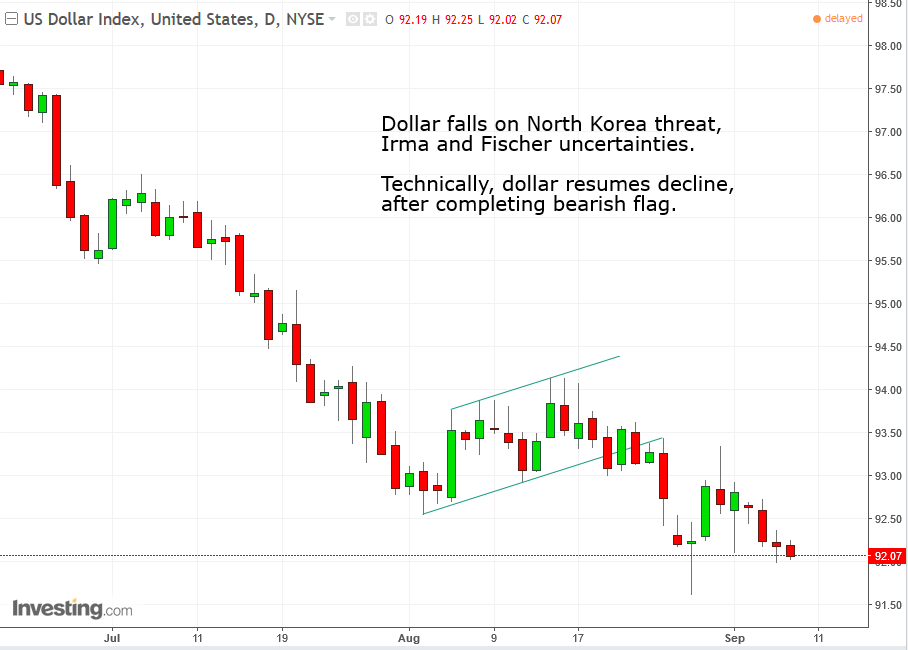
- The Dollar Index declined 0.1 percent, its fourth straight down day.
- The euro rose 0.2 percent to $1.1943, the strongest in more than a week.
- The British pound increased less than 0.05 percent to $1.3047, its strongest position in five weeks.
- The Japanese yen climbed 0.2 percent to 108.98 per US dollar.
Bonds
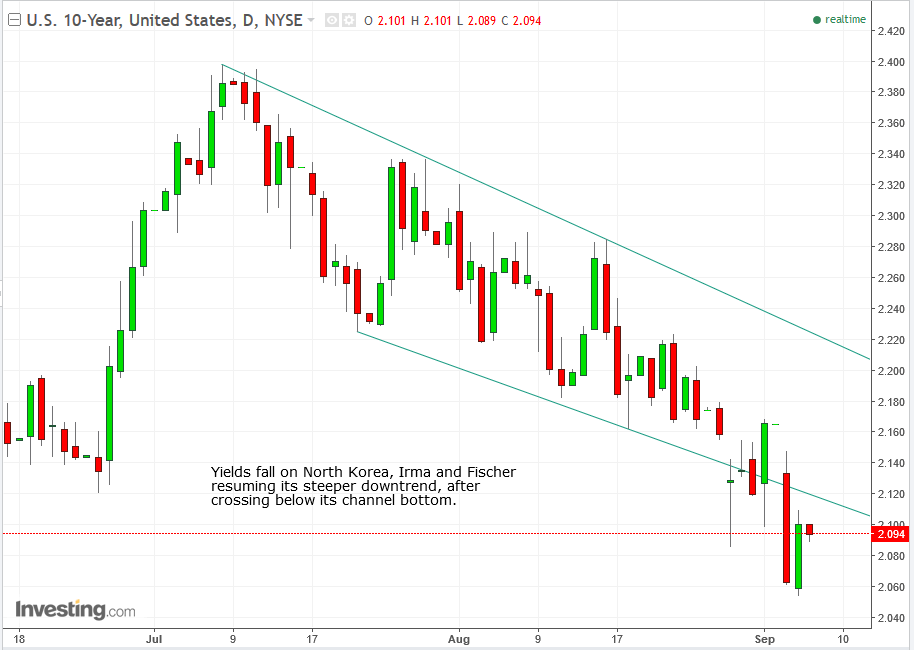
- The yield on 10-year Treasuries declined one basis point to 2.09 percent.
- Germany’s 10-year yield increased one basis point to 0.36 percent.
- Britain’s 10-year yield rose two basis points to 1.026 percent.
Commodities
